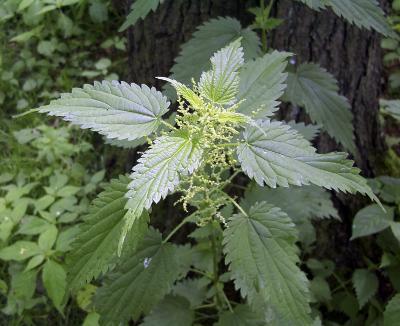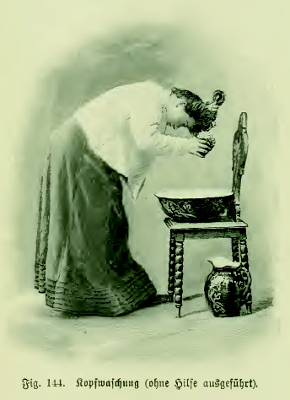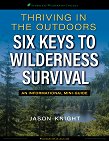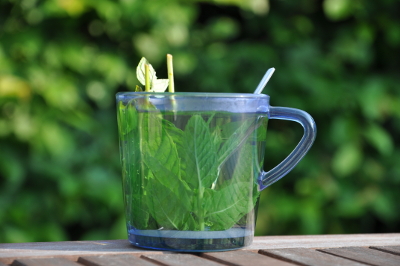Nettle for Hair

Herbalists use stinging nettle for hair and other scalp-related issues. Learn how to make your own nettle remedies for overall health that leaves your hair vibrant and healthy!
About Stinging Nettle (Urtica dioica)
Nettle, more commonly known as Stinging Nettle, is a handsome plant that can be found in moist areas throughout North America and has many health benefits.
Nettle is known for the spiny hairs located on the underside of the lanceolate leaves as well as the stem. You may have, at one point, brushed up against this plant and noticed a sudden rash or itchy sensation! This is because those spiny hairs have chemicals within them that, when touched, can cause rash, small bumps and a general itchy sensation.
Have no fear! When the right precautions are taken nettle can be safely harvested and used for food, medicine and utilitarian purposes. This plant can also be ordered from a variety of sources.
Though this plant may have a bit of a bite to it, nettle has been used safely for thousands of years both internally and externally due to its many medicinal qualities and high vitamin content.
Nettle for Hair and Scalp
Herbalists use nettle for hair and a variety of scalp related issues. Nettle on its own, or more preferably mixed with other herbs, can aid in promoting hair growth and help combat oily hair, dry hair, and dandruff.
Here are a couple ways to incorporate nettle and other herbs into your daily routine to help promote overall health and leave your hair and scalp vibrant and healthy:
• Herbal Hair Rinses
• Internal Infusions

Herbal Hair Rinses
Using a rinse of nettle for hair, during or after you shower, is a lovely way to support the overall health of your hair. You can create an herbal hair rinse using only nettle, or combine it with other herbs to leave your hair feeling good and smelling heavenly!
All herbs used in the following recipes are dried, but fresh herbs will also work well.
Struggle with Oily Hair?
Try out this infusion of nettle for hair - its astringent herbs will help combat excessive oil and dandruff from roots to tips!
Ingredients:
Fill a pint or quart jar with:
- 1 part Rosemary
- 1 part Rose buds, flowers or petals
- 1 part Nettle leaf
- A few drops of essential oil of choice (optional)
Step by Step:
1) Bring 1 pint or 1 quart of water to boil, depending on the quantity you would like to make.
2) Pour boiling water over herbs and let steep for 15-30 min or place in the fridge and infuse overnight. The longer you steep the better!
3) Once herbs have been infused into the water, strain out the herbs and place in compost or toss outside to let decompose.
4) Use this cooled down hair rinse after shampooing or in place of shampooing.
5) Massage rinse into your scalp making sure you work it into your roots all the way down to your tips. Enjoy this process, mindfulness can be part of the medicine. Do not rinse out! If you have very oily hair my suggestion would be to use this in addition to a natural shampoo.
Be More Prepared For Your Next Outdoor Adventure!

Don't leave home without knowing these six essential survival skills. Our free survival mini guide reveals the strategies of:
- Shelter & fire to prevent the number one cause of death
- Obtaining clean water to avoid life-threatening dehydration
- Common wild survival foods and other critical skills!

Hair Dry and Damaged?
The soothing properties in this infusion of nettle for hair can calm the scalp while adding a vibrant glow to hair:
Ingredients:
Fill a pint or quart jar with:
- 1 part Peppermint
- 1 part Chamomile
- 1 part Nettle
Step by Step:
1) Bring 1 pint or 1 quart of water to boil, depending on the quantity you would like to make.
2) Pour boiling water over herbs and let steep for 15-30 min or place in the fridge and infuse overnight. The longer you steep the better!
3) Once herbs have been infused into the water, strain out the herbs and place in compost or toss outside to let decompose.
4) Use this cooled down hair rinse after shampooing or in place of shampooing.
5) Massage rinse into your scalp making sure you work it into your roots all the way down to your tips. Enjoy this process, mindfulness can be part of the medicine. Do not rinse out! If you have very dry hair my suggestion would be to use this instead of shampoo a couple times a week.
Losing Hair or Hair Looking a Little Thin?
Use the steps from the recipes above; replace the herbs with the following:
- Nettle
- Burdock Root
- Rosemary
- Sage
These herbs will stimulate blood flow, give hair follicles the nutrients they need and provide fatty acids that are necessary in promoting new hair growth.
Other herbs can be substituted in these recipes depending on their medicinal qualities and compounds.
Play around, have fun and see what works best for your hair!
Normal Hair: Basil, Lavender, Parsley Leaf, Sage, Calendula and Watercress
Oily Hair: Bay Leaf, Burdock Root, Lemon Balm, Lavender, Lemon Peel, Lemon Grass, Thyme and Yarrow
Dry hair: Burdock Root, Comfrey Leaf, Marshmallow Root, Elder Flowers and Sage
Other Ways to Use Nettle for Hair Care
Internal Nettle Infusions:
Nettle is chalk full of vitamins and minerals; so much so that many use nettles as a daily tonic (infusion) taken alone or with other herbs to promote overall health not only for hair but for bone density, seasonal allergies, inflammation, and more.
Creating nettle infusions (tonics) and teas can be another way to support full, healthy, resilient hair from the inside out! These infusions are very similar to the herbal hair rinses located above, with one key difference; no essential oils are added! (do not ingest essential oils internally unless directed by a health care practitioner).

Daily Nettle Tonic
Take the tea below as a daily tonic to support your hair health and well-being from the inside:
Ingredients:
- 1 part Nettle
- 1 part Rosemary
- 1 part Rose Hips
These herbs can be safely taken in teas and infusions 2-3 times a day to provide the whole body with vitamins and minerals.
Step by Step:
1) Bring 1-2 cups of water to boil.
2) Place herbs in tea infuser or any form of reusable tea bag and let steep for 15-20 min.
3) Once steeping is finished remove herbs and place in compost or toss outside to let decompose.
4) Add a dash of honey if you have a sweet tooth and enjoy!
It is important to keep in mind that one plant alone cannot entirely fix our hair wants and wishes. We have to take a step back and look at other factors such as, how often you are showering, what products you currently using for your hair, the temperature of your water and your own hair at its baseline.
Herbs are a great way to naturally improve your hair and assist you in getting the results you want. Keeping a holistic view will ensure happy, healthy hair in no time!
By the way, when you're out foraging, it's important to know how to stay safe in the outdoors, especially if you were to get lost. Right now you can get a free copy of our mini survival guide here, where you'll discover six key strategies for outdoor emergencies, plus often-overlooked survival tips.
Want to learn more about how to use nettle and other wild plants?
Check out our Wild Edible and Medicinal Plants Courses.
To find more information on nettle for hair and all of these herbs, check out these resources:
Forêt, R. D. (2017). Alchemy of Herbs: transform everyday ingredients into foods & remedies that heal. Carlsbad, CA: Hay House, Inc.
Green, J. (1990). The Herbal Medicine-Makers Handbook. Forestville, CA: Wildlife & Green.
Cited:
Gladstar, R. (2009). Rosemary Gladstars Herbal Recipes for Vibrant Health. Pownal, VT: Storey.
PDR for Herbal Medicines. (1998). Montvale, NJ: Medical Economics Co
https://blog.mountainroseherbs.com/herbal-hair-care
Moore, M. (2011). Medicinal Plants of the Pacific West. Santa Fe: Museum of New Mexico Press.

About the Author: Emily Nealley is an experienced outdoor educator and herbalist. Emily wrote articles while working at Alderleaf. Learn more about Emily Nealley.
Return from Nettle for Hair back to Wild Plants Articles
Is The Essential Wilderness Survival Skills Course Right for You? Take the "Online Survival Training Readiness" Quiz
See for yourself if this eye-opening course is a good fit for you. It takes just a few minutes! Get your Survival Training Readiness Score Now!

Grow Your Outdoor Skills! Get monthly updates on new wilderness skills, upcoming courses, and special opportunities. Join the free Alderleaf eNews and as a welcome gift you'll get a copy of our Mini Survival Guide.

 The Six Keys to Survival: Get a free copy of our survival mini-guide and monthly tips!
The Six Keys to Survival: Get a free copy of our survival mini-guide and monthly tips!
Learn more